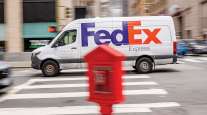UPS Pension Plan Change Lowers Fourth-Quarter Profits
This story appears in the Feb. 6 print edition of Transport Topics.
Fourth-quarter freight volumes and pricing generally improved for UPS Inc., but quarterly earnings declined because of a one-time $827 million noncash charge for pension accounting, the company said Jan. 31.
For the quarter, the largest North American freight transportation company earned $725 million, or 74 cents a share, on revenue of $14.17 billion. For the final three months of 2010, it had net income of $1.025 billion, or $1.02 a share, on revenue of $13.42 billion.
For the full year, UPS, Atlanta, earned $3.8 billion, or $3.84 a share, on revenue of $53.1 billion. In 2010, the company earned $3.34 billion, or $3.33 a share, on revenue of $49.5 billion.
UPS Chairman and CEO Scott Davis said in an earnings call following the release that the U.S. economy is doing better than those of many other countries and that his company benefited from a strong fourth quarter.
“During December, we were very busy at UPS. . . . In fact, we experienced our busiest peak ever, delivering almost 500 million packages between Thanksgiving and Christmas. And UPS wrapped up the year with record earnings per share, free cash flow exceeding $5 billion and a new high in return on invested capital,” he said.
“All in all, the U.S. market performed very well, growing at a faster pace than we projected. Turning our focus to other parts of the world, in Europe, recession concerns, the debt crisis and the instability of the euro dominated headlines, but for UPS, solid growth continued, while in Asia, economic output and our volume lagged expectations,” Davis said.
The new accounting policy for evaluating asset values in pension plans, often called “mark to market,” took effect Oct. 1. Therefore, formal figures for the 2011 quarter used the new policy and figures for the year-ago quarter did not.
The company offered an adjusted comparison to put the two quarters on even footing with respect to pension accounting, saying quarterly net income rose 17.2% to $1.25 billion from $1.07 billion.
Chief Financial Officer Kurt Kuehn said the UPS funding level for its pension obligations was 94% at year-end.
The company’s Deferred Air service for U.S. packages grew most strongly, with volume rising 12.3% during the quarter compared with the 2010 fourth quarter. Davis said the service was particularly popular among shippers of lightweight goods and from e-commerce companies.
Ground parcel volume grew more modestly, at 3.5% for the quarter, while volume for Next-Day Air contracted by 1%, year-over-year.
Kuehn said that for parcel work, there are now two peaks for fourth-quarter shipping. The first comes right after Black Friday through Cyber Monday, the four days immediately following Thanksgiving, and the second peak is the one-week run-up to Christmas.
Pricing at UPS Freight, the company’s less-than-truckload carrier, improved as quarterly revenue grew by 9% to $632 million, even though shipments and gross weight hauled contracted. Yield, as measured by revenue per hundredweight, rose 8.9% during the quarter to $21.73.
Two stock analysts differed in their assessments of the report.
“We are encouraged that in spite of a challenging global economic environment, the UPS business model continues to perform . . . We reiterate our ‘Buy’ rating,” Kevin Sterling wrote to clients of BB&T Capital Markets.
“It’s hard to take much issue with the report, although the deceleration in yields was enough for us to feel satisfied about having moved to ‘market weight [Hold]’ positions two weeks ago,” said Peter Nesvold, writing for Jefferies & Co.
With the U.S. economy doing better than Europe’s, Davis and Kuehn said the U.S. dollar has appreciated against the euro and some other currencies, and that has led to a diminishment in U.S. export trade.
Assuming “mixed economic growth” around the world and more “modest improvement” in the United States, Kuehn said UPS earnings per share should improve by 9% to 15% this year, relative to 2011. He gave a target range of $4.75 to $5 a share.




